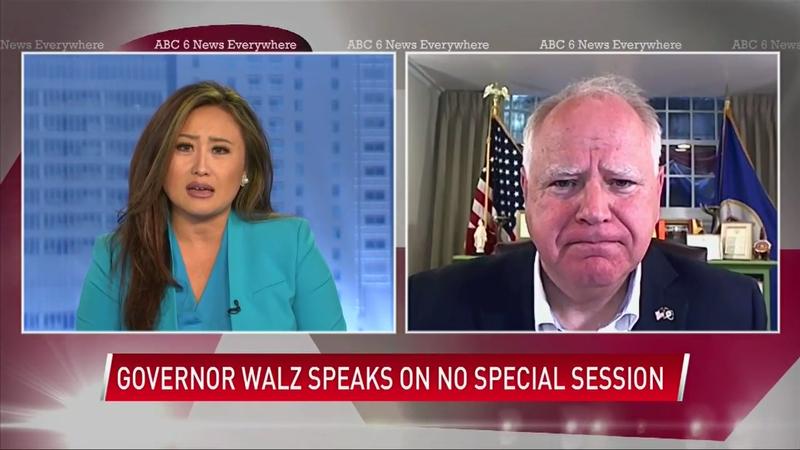Gov. Walz on the special session breakdown & what’s next for Minnesotans
[anvplayer video=”5116390″ station=”998128″]
(ABC 6 News) – After weeks of negotiating, Minnesota lawmakers could not come to an agreement for a special session on major legislation with the state’s $9 billion surplus.
ABC 6 News Anchor Laura Lee spoke with Governor Tim Walz about what this means for Minnesotans moving forward.
Before the session ended there appeared to be compromise, bipartisan agreement on issues like public safety and education. What happened with the talks?
"It’s frustrating. Minnesota is in a strong position, we have a record surplus, and we compromised on frontline worker pay and unemployment insurance. Politics always play into every decision, I think if the Senate comes back to the table we are very close," said Gov. Walz.
Senate Majority Leader Jeremy Miller says that Democrats weren’t willing to pass this bill without billions of dollars more in spending, what did he mean?

"I’m not sure what the leader means, he signed the agreement that had 4 billion in spending, specifically in areas of long-term care and nursing homes, education funding, mostly on cross-subsidy no new programs, public safety about 300 million to go to communities and our share of the matching funds for roads and bridges and that was agreed upon," said Gov. Walz, "there is no additional spending, no more above the limit inside those spending areas, we were more than willing, we met Republicans more than halfway, in some cases, 60 to 70 percent of the spending priorities were senate republicans, so i think the follow-up question to the leader is, what spending is he talking about, and if that was too much, why did they agree to it and sign their names."
Without a special session and a budget surplus, what can Minnesotans expect moving forward?
"What will happen in both education and public safety communities will be, they will be asked to make a difficult choice and look toward property taxes to meet those needs. What some community needs are more police officers, we’ve seen post-COVID across the nation and globally a crime tick up, we at the state are trying to do what we can do with state patrol and those things, but the bottom line is local communities know best. I traveled to Rochester, to Duluth, and across the state and what they told me is, just give us the money and we will be able to invest it and that is exactly what I put forward, no strings attached, 300 million dollars to go to local communities to do their public safety needs," said Gov. Walz.
He added, "I think if Minnesotans are asking the question, why in the world would we not have these resources to deal with them, I’m in agreement with them and I would sign that piece of legislation today. These are Minnesotans’ tax dollars that can go back and we’re talking about the single largest tax cut since 1858, and that is all ready to be signed, we just need an agreement."
Do you think this will hurt your re-election chances come November, with no agreement, no special session, and these decisions not being made?
"Well, I would hope Minnesotans would see through that, that is not my concern. My major concern is as global prices go up inflation is there, from gas prices to food prices. Minnesotans have an ability, and I will still make the case, why don’t we just send back the money to Minnesotans in the form of a check so that they can pay the bills with that. If the legislature can’t decide what to do it, I certainly believe Minnesotans can," Gov. Walz said, "I would certainly hope this isn’t about politics to try to punish me at the expense of Minnesotans because otherwise, it makes no sense."
In a final statement, Gov. Walz said, "I want to be clear, yesterday Republicans said no more offers will be made, and I said I will continue to make offers to them. Tell me where specifically you think we are asking for too much, and what we can do to reach a compromise, so I would just ask them to come back to the table, Minnesotans are expecting us to do that," said Gov. Walz, "I’m not getting everything I wanted, in fact in education, I had what I thought were really good proposals, i gave up all of them to try to reach a compromise."